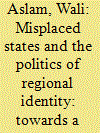| Srl | Item |
| 1 |
ID:
177607


|
|
|
|
|
| Summary/Abstract |
Whilst there is no shortage of analyses on the politics of regions in International Relations, little attention has been paid to states who perceive that they do not properly fit in the regions they happen to be located in. These are the ‘misplaced states’: they stand out not so much because of material capacities but because they espouse an identity, manifested in different ways, in marked contrast to the states around them. This article asks what causes this process of a change in identity amongst misplaced states in different parts of the world. Comparing across regions, it analyses why and how states reconstruct their identities in order to enhance or deemphasise their degrees of regional conformity. By focusing on the ‘role-location process’ rooted in role theory, this article contributes to the literature by conceptualising the phenomenon of ‘misplacement.’ A state is misplaced when there is mismatch between its aspirations and others’ expectations for it. The article also details how and why misplacement occurs and studies its implications both for the states in question as well as for the politics of their geographical regions.
|
|
|
|
|
|
|
|
|
|
|
|
|
|
|
|
| 2 |
ID:
177609


|
|
|
|
|
| Summary/Abstract |
Pakistan has been a misplaced state from its birth. Created as a separate homeland for the Muslims of the Subcontinent, it considers itself to be a misfit in a multi-faith, South Asian region dominated by India. This paper analyses Pakistan’s misplaced identity utilising the layered model of identity change. The model helps us focus on various foreign-policy roles that Pakistan performs. The deepest layer (most resistant to change) denotes Pakistan’s identity as a sovereign and independent state, outlining the roles of an alliance partner and a nuclear power. The middle layer represents the identity of Pakistan as an insecure state with the roles of a ‘chancer’ state, a regional intermediary and the regional leader. The top (and least sedimented) layer points to Pakistan’s identity as a Muslim state, giving birth to the hoped-for roles of the leader of the Muslim world, an Islamic crusader, and the defender of the faith. However, Pakistan has been unable to gain acknowledgement for these roles either in South Asia or elsewhere. The country’s attempts to re-imagine a cognitive home for itself in the Middle East have also not come to fruition. It continues to be a misplaced state, cognitively dissociated from its geographic home.
|
|
|
|
|
|
|
|
|
|
|
|
|
|
|
|
| 3 |
ID:
177606


|
|
|
|
|
| Summary/Abstract |
It gives me great pleasure to present to the readers of the Cambridge Review of International Affairs (CRIA) this special issue (entitled Misplaced states and the politics of regional identity) that forms CRIA’s Volume 33, Issue 4. The issue consists of a theoretical article and six case studies. The theoretical article introduces the phenomenon of ‘misplaced statehood’ while the cases of Israel, Pakistan, Chile, Japan, South Africa and Brazil examine its manifestations in international politics.
|
|
|
|
|
|
|
|
|
|
|
|
|
|
|
|